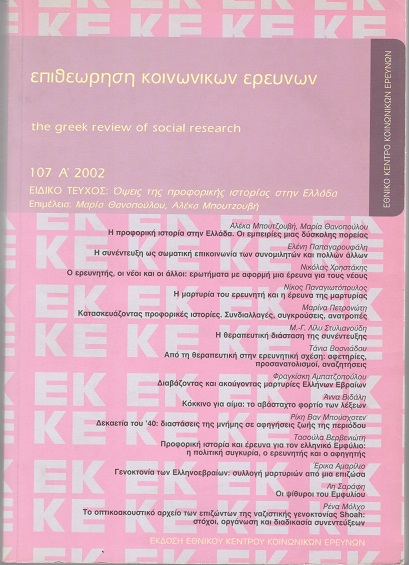Η συνέντευξη ως σωματική επικοινωνία των συνομιλητών και πολλών άλλων
Abstract
Πολλοί ανθρωπολόγοι διαχωρίζουν τη «γλωσσική-συμβολική» αναπαράσταση μιας εμπειρίας από την «πραγματικά βιωμένη» εμπειρία. Στο άρθρο αυτό αντικρούω την οντολογική διαφορά μεταξύ «γλώσσας» και «εμπειρίας» υποστηρίζοντας ότι και η γλώσσα είναι πρακτική εμπειρία ή habitus. Κατά συνέπεια, οι αφηγήσεις που συναλλάσσουμε σε μια συνέντευξη-συνομιλία είναι πολιτισμικά και χρονικά επηρεασμένες σωματικές προδιαθέσεις ή πρακτικές. Όταν συνομιλούμε, βιώνουμε τις σχέσεις που είχαμε, έχουμε και θέλουμε να έχουμε με πραγματικούς και φανταστικούς άλλους, και οι οποίες είναι υπεύθυνες για τις «λεκτικές χειρονομίες» μας, κατά τη συνέντευξη. Γι ' αυτό και το νόημα της συνομιλίας δε βρίσκεται ποτέ εξ ολοκλήρου στη συνομιλία καθαυτήν. Με άλλα λόγια, η συνέντευξη δεν είναι ένα είδος παροντικής αλληλο-αναπαράστασης ή αλληλο-παρατήρησης των συνομιλούντων αλλά πολυαισθητηριακή και συναισθηματική εμπλοκή στον κόσμο
Article Details
- How to Cite
-
Παπαγαρουφάλη Ε. (2002). Η συνέντευξη ως σωματική επικοινωνία των συνομιλητών και πολλών άλλων. The Greek Review of Social Research, 107, 29–46. https://doi.org/10.12681/grsr.8996
- Section
- Articles

This work is licensed under a Creative Commons Attribution-NonCommercial 4.0 International License.
Authors who publish with this journal agree to the following terms:
- Authors retain copyright and grant the journal right of first publication with the work simultaneously licensed under a Creative Commons Attribution Non-Commercial License that allows others to share the work with an acknowledgement of the work's authorship and initial publication in this journal.
- Authors are able to enter into separate, additional contractual arrangements for the non-exclusive distribution of the journal's published version of the work (e.g. post it to an institutional repository or publish it in a book), with an acknowledgement of its initial publication in this journal.
- Authors are permitted and encouraged to post their work online (preferably in institutional repositories or on their website) prior to and during the submission process, as it can lead to productive exchanges, as well as earlier and greater citation of published work (See The Effect of Open Access).



